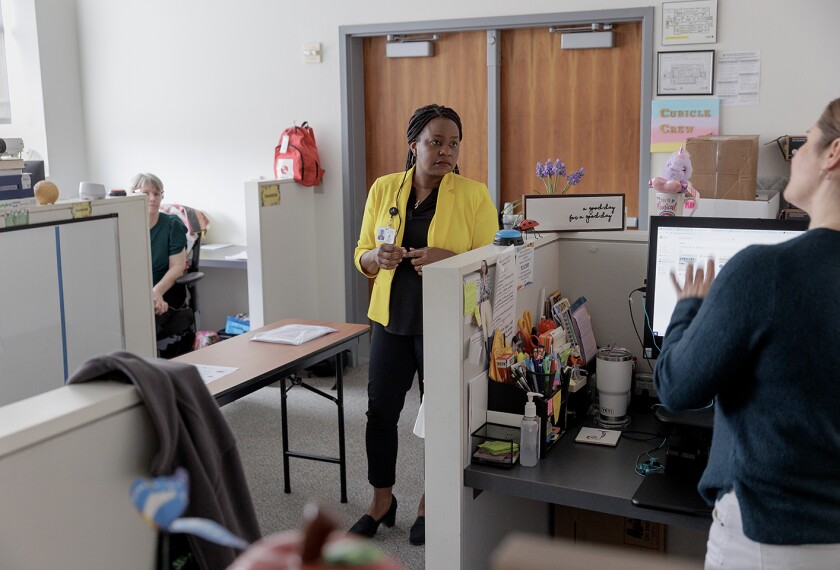When Kate Maxlow began the process of overhauling her Virginia district’s curriculum, she didn’t just send out a survey to get student input.
Maxlow, the director of curriculum, instruction, and assessment for the Hampton City schools on Virginia’s Eastern Shore, worked to deeply involve students in the curriculum-development process—and compensate them for their time and expertise.
Maxlow, who has spent more than a decade with the district leading professional development and curriculum development, created an internship program that pays about a dozen high school students $19 an hour to help conduct annual reviews of the district’s curriculum each summer. Interns give feedback on how existing lessons resonate with students and offer suggestions to make classwork more engaging and relevant to children and teens. In some cases, these students help write lessons and design classroom activities for younger students.

The district’s student interns have filmed videos for elementary schoolers demonstrating math games, suggested new reading materials, and written passages to supplement lessons in classes including science and social studies.
The program is widely regarded as a success in Hampton. But it’s taken time and patience, particularly for staff, who have had to “put ego aside” to make room for students’ input, Maxlow said.
Maxlow spoke to Education Week via Zoom about the internship program. She talked about how she’s elevated student input. This interview has been edited for length and clarity.
Where should a district start when it decides to take on this work?
The very first thing that we had to do was really take an honest audit of our curriculum and assess whether the activities that are included, is it because they’re high-quality activities that students find emotionally and cognitively engaging? Or is it because we just happened to find them on a website somewhere and it looked like they aligned with content standards?
People have been so focused for so long on passing tests, that at first it was a really tough sell, but once you get one department rewriting their curriculum that way, then everybody else sees what it can look like. Eventually, at some point, it catches fire, and everybody starts realizing, “Oh my gosh, this is possible.”
What is or has been the biggest challenge in authentically incorporating students’ feedback and ideas?
Some of our curriculum writers, they’ve been working on this for years and they really take pride in that. They can feel like the curriculum is their baby. So there were some tough conversations that needed to be had, like, yes, this is good work, but is this really what students want to be doing or is it what adults think students should want to be doing?

I’d say the other thing is just getting started and changing some of those long-standing perceptions of what rigor and achievement look like.
People seem to think that there’s this dichotomy—you can either have good test scores or you can have student engagement, but actually, the more your students are engaged, the better your scores are going to be, assuming that what you’re teaching is aligned with content standards.
When we don’t work with students as partners on their educational journeys, that is when they shut down. And sometimes, they’re gonna shut the whole classroom down if they’re bored enough. The number one thing we have to do is remember that everybody can learn from everybody, and even if young people don’t know everything that we know, they know things that we don’t.
How do you balance students’ preferences with the need to ensure content aligns with state standards?
We do talk to the students beforehand and are clear that just because they make a suggestion, that doesn’t necessarily mean it’s going to be implemented. But what we do promise is that it’s going to be strongly considered along with all of the evidence for why we’re doing what we’re doing.
It’s like when you’re doing any other research, like in a science lab, for example, you’re weighing all of the factors and potential variables to find the right combination.
It’s the same here—it’s all just a piece of the puzzle that’s going to help us ultimately do what we need to do to make our young people successful when they leave us







